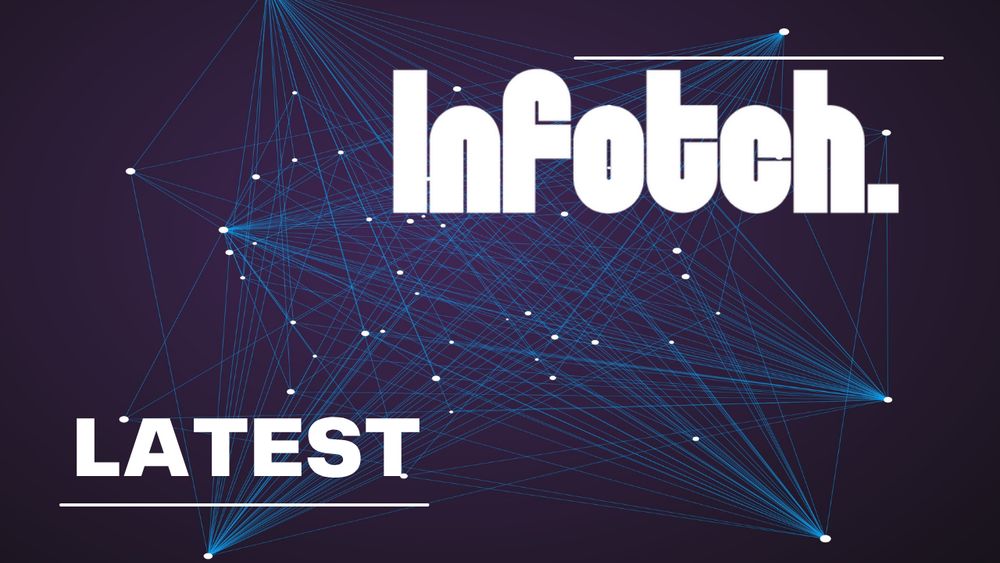
Infotch
@infotch.com
Infotch is your trusted source for tech news, tools, reviews, and insights. From emerging startups to breakthrough AI, we break down the trends that shape the digital world. Built on a 1998 legacy, reimagined for today’s tech-driven future. www.infotch.com
OpenAI Unveils ChatGPT Atlas: The AI-Powered Browser Set to Disrupt Google's Chrome Empire

OpenAI Unveils ChatGPT Atlas: The AI-Powered Browser Set to Disrupt Google's Chrome Empire
In a bold escalation of the AI arms race, OpenAI has officially launched ChatGPT Atlas, a revolutionary web browser that embeds its flagship ChatGPT chatbot directly into the browsing experience. Announced on October 21, this isn't just another browser—it's a strategic strike at Google Chrome's ironclad market grip, promising to redefine how we interact with the web through intelligent summarization, automation, and seamless task execution.
dlvr.it
October 22, 2025 at 1:22 PM
OpenAI Unveils ChatGPT Atlas: The AI-Powered Browser Set to Disrupt Google's Chrome Empire
Real Estate Agents Should Be Worried AI Just Got a Real Estate License. From Listings to Loans: How Artificial Intelligence Is Automating Real Estate

Real Estate Agents Should Be Worried AI Just Got a Real Estate License. From Listings to Loans: How Artificial Intelligence Is Automating Real Estate
The real estate industry is experiencing a seismic shift, propelled by artificial intelligence (AI). No longer confined to drafting property listings or automating follow-ups, AI is infiltrating critical functions like buyer-property matching, mortgage guidance, and deal facilitation. In 2025, the PropTech wave is dismantling traditional commission-heavy models, forcing real estate agents to adapt or risk obsolescence. This article explores how AI is reshaping the real estate stack, highlighting key innovations, challenges, and future trends.
dlvr.it
October 17, 2025 at 10:55 PM
Real Estate Agents Should Be Worried AI Just Got a Real Estate License. From Listings to Loans: How Artificial Intelligence Is Automating Real Estate
The Future of Transportation: The Rise of Robotaxis

The Future of Transportation: The Rise of Robotaxis
The transportation landscape is undergoing a seismic shift, with autonomous vehicles at the forefront of this revolution. Among these, robotaxis—self-driving taxis that operate without a human driver—are poised to redefine urban mobility. Combining cutting-edge artificial intelligence, advanced sensors, and robust connectivity, robotaxis promise to make transportation safer, more efficient, and accessible. This article explores the rise of robotaxis, their technological underpinnings, benefits, challenges, and their potential to transform how we move.
dlvr.it
October 17, 2025 at 10:42 PM
The Future of Transportation: The Rise of Robotaxis
Neuralink’s Brain Chip Breakthrough: Are We Ready for the First Real Cyborgs?

Neuralink’s Brain Chip Breakthrough: Are We Ready for the First Real Cyborgs?
The line between humans and machines is becoming increasingly blurred. Neuralink, Elon Musk’s ambitious brain–computer interface (BCI) company, recently achieved a milestone by implanting its brain chip into a human for the first time. This step, while controversial and filled with ethical, medical, and social questions, could change the way we think about intelligence, disability, and even what it means to be human. But with great technological leaps come equally great responsibilities. Are we truly ready for the dawn of cyborgs?
This article explores Neuralink’s purpose, process, breakthroughs, risks, ethical dilemmas, and the future it envisions for humanity.
dlvr.it
October 17, 2025 at 10:42 PM
Neuralink’s Brain Chip Breakthrough: Are We Ready for the First Real Cyborgs?
AI-Powered Ads: How Artificial Intelligence Is Rewriting the Rules of Digital Marketing

AI-Powered Ads: How Artificial Intelligence Is Rewriting the Rules of Digital Marketing
AI-Powered Ads: How Artificial Intelligence Is Rewriting the Rules of Digital Marketing
dlvr.it
October 14, 2025 at 3:58 AM
AI-Powered Ads: How Artificial Intelligence Is Rewriting the Rules of Digital Marketing
WATCH: The AI Monopoly Problem: Why Five Companies Control the Future of Intelligence

WATCH: The AI Monopoly Problem: Why Five Companies Control the Future of Intelligence
dlvr.it
October 11, 2025 at 5:08 PM
WATCH: The AI Monopoly Problem: Why Five Companies Control the Future of Intelligence
Forget Tinder & Bumble: This New AI Dating App Promises Real Matches, Not Endless Swipes

Forget Tinder & Bumble: This New AI Dating App Promises Real Matches, Not Endless Swipes
Online dating often feels like a grind—swiping through profiles, chasing fleeting conversations, and enduring dates that lead nowhere. Despite their promise to simplify love, apps like Tinder, Bumble, and Hinge have left many singles exhausted and disillusioned. Amata, a new AI-powered dating app, aims to change that. By leveraging artificial intelligence to handle matchmaking and date planning, Amata eliminates the endless scroll and focuses on creating meaningful connections. Could this be the future of finding love?
dlvr.it
October 9, 2025 at 3:54 AM
Forget Tinder & Bumble: This New AI Dating App Promises Real Matches, Not Endless Swipes
Social Media Algorithms Under Scrutiny: Are They Controlling What You See Online?

Social Media Algorithms Under Scrutiny: Are They Controlling What You See Online?
In 2025, social media platforms like TikTok, Instagram, X, and Facebook have transformed from simple connection tools into powerful ecosystems driven by algorithms that dictate what you see, how you engage, and even how you perceive the world. In the United States, where over 80% of adults use social media daily, these algorithms are under intense scrutiny for fueling division, spreading misinformation, and impacting mental health. As lawmakers, researchers, and users demand accountability, the question looms: Are tech giants’ algorithms running unchecked, or can users reclaim control? This article dives into the mechanics of these algorithms, their consequences, emerging U.S.-led regulations, and what the future holds for social media users.
dlvr.it
October 4, 2025 at 9:31 PM
Social Media Algorithms Under Scrutiny: Are They Controlling What You See Online?
Spotify and Amazon's DSP Deal Ushers in a New Era for Programmatic Audio Ads

Spotify and Amazon's DSP Deal Ushers in a New Era for Programmatic Audio Ads
In a landmark partnership announced on October 1, 2025, Spotify has opened its vast audio and video ad inventory to Amazon's Demand-Side Platform (DSP), enabling programmatic buying for the first time. This deal promises to supercharge programmatic audio advertising by blending Amazon's shopper data with Spotify's 696 million engaged listeners, potentially lowering costs, boosting reach, and transforming how brands target music-streaming audiences. This article explores the mechanics of the agreement, its immediate benefits, and the broader ripple effects on the evolving audio ad landscape.
dlvr.it
October 2, 2025 at 2:50 AM
Spotify and Amazon's DSP Deal Ushers in a New Era for Programmatic Audio Ads
Are Traditional Ads Still the Best Way to Reach Your Audience

Are Traditional Ads Still the Best Way to Reach Your Audience
Why traditional advertising remains a powerful alternative to programmatic ads, offering trust, simplicity, and human connection amidst digital challenges like privacy concerns and ad fraud.
dlvr.it
October 2, 2025 at 12:08 AM
Are Traditional Ads Still the Best Way to Reach Your Audience
Has Programmatic Advertising Ruined the Internet?

Has Programmatic Advertising Ruined the Internet?
We explore the simplicity of early web advertising with the complex, algorithm-driven world of programmatic advertising. It outlines the promise of programmatic—efficiency, precision targeting, and scalability—and questions whether its rise has degraded the online experience. Highlighting issues like intrusive ads, privacy concerns, and low-quality content.
dlvr.it
October 1, 2025 at 11:54 PM
Has Programmatic Advertising Ruined the Internet?
The Startup That Could Break Nvidia’s Grip: Modular Wants to Make AI Work Everywhere

The Startup That Could Break Nvidia’s Grip: Modular Wants to Make AI Work Everywhere
Nvidia's dominance in AI compute is under serious threat from Modular, a startup that recently secured $250 million at a $1.6 billion valuation. This analysis details how Modular's MAX Engine and Mojo programming language function as an "AI Hypervisor," decoupling AI models from proprietary hardware like CUDA. Learn how this solution enables seamless, high-performance deployment across all vendors (Nvidia, AMD, custom silicon) and why it's poised to become the universal, hardware-agnostic foundation for the next era of AI, saving enterprises billions in compute costs and challenging the hardware lock-in paradigm.
dlvr.it
October 1, 2025 at 11:14 PM
The Startup That Could Break Nvidia’s Grip: Modular Wants to Make AI Work Everywhere
This $3,000 Smart Fridge Forgot It Was Smart — And Reddit Can’t Stop Laughing

This $3,000 Smart Fridge Forgot It Was Smart — And Reddit Can’t Stop Laughing
A viral Reddit post exposes the hilarious and frustrating failures of a $3,000 AI-powered smart fridge that forgot its entire contents, including leftover pizza. This analysis dives into the fundamental flaws of food recognition AI, unreliable IoT kitchen tech, and why expensive smart appliances are often proving less functional than their 'dumb' counterparts, becoming cautionary tales of modern home over-engineering.
dlvr.it
October 1, 2025 at 11:00 PM
This $3,000 Smart Fridge Forgot It Was Smart — And Reddit Can’t Stop Laughing
Facebook Unveils Fan Challenges and Custom Badges for Creators

Facebook Unveils Fan Challenges and Custom Badges for Creators
These updates show us that Meta wants fans to take Facebook more seriously as a place to engage with creators.
dlvr.it
September 29, 2025 at 8:38 PM
Facebook Unveils Fan Challenges and Custom Badges for Creators
Brave Boosts AI Search with Detailed Answers Feature!

Brave Boosts AI Search with Detailed Answers Feature!
Brave is debuting a new detailed answer feature for its AI-powered search
dlvr.it
September 29, 2025 at 4:48 PM
Brave Boosts AI Search with Detailed Answers Feature!
Watch Out for AI-Generated 'Workslop' from Coworkers!

Watch Out for AI-Generated 'Workslop' from Coworkers!
Researchers at consulting firm BetterUp Labs, in collaboration with Stanford Social Media Lab, have coined a new term to describe low-quality, AI-generated work
dlvr.it
September 28, 2025 at 12:16 AM
Watch Out for AI-Generated 'Workslop' from Coworkers!
Vibe Coding: Trend or Game Changer at Disrupt 2025?

Vibe Coding: Trend or Game Changer at Disrupt 2025?
Lauri Moore (Bessemer), David Cramer (Sentry), and Zach Lloyd (Warp) join the Builders Stage at TechCrunch Disrupt 2025 to debate what founders really need from their first engineering hires — and how AI tooling fits into the equation.
dlvr.it
September 27, 2025 at 4:28 AM
Vibe Coding: Trend or Game Changer at Disrupt 2025?
Massive Data Leak: Thousands of Indian Bank Transfers Exposed!

Massive Data Leak: Thousands of Indian Bank Transfers Exposed!
Security researchers found the exposed Indian bank transfer records, and the data was eventually secured. Indian fintech company NuPay took responsibility for the "configuration" error.
dlvr.it
September 26, 2025 at 4:19 PM
Massive Data Leak: Thousands of Indian Bank Transfers Exposed!


